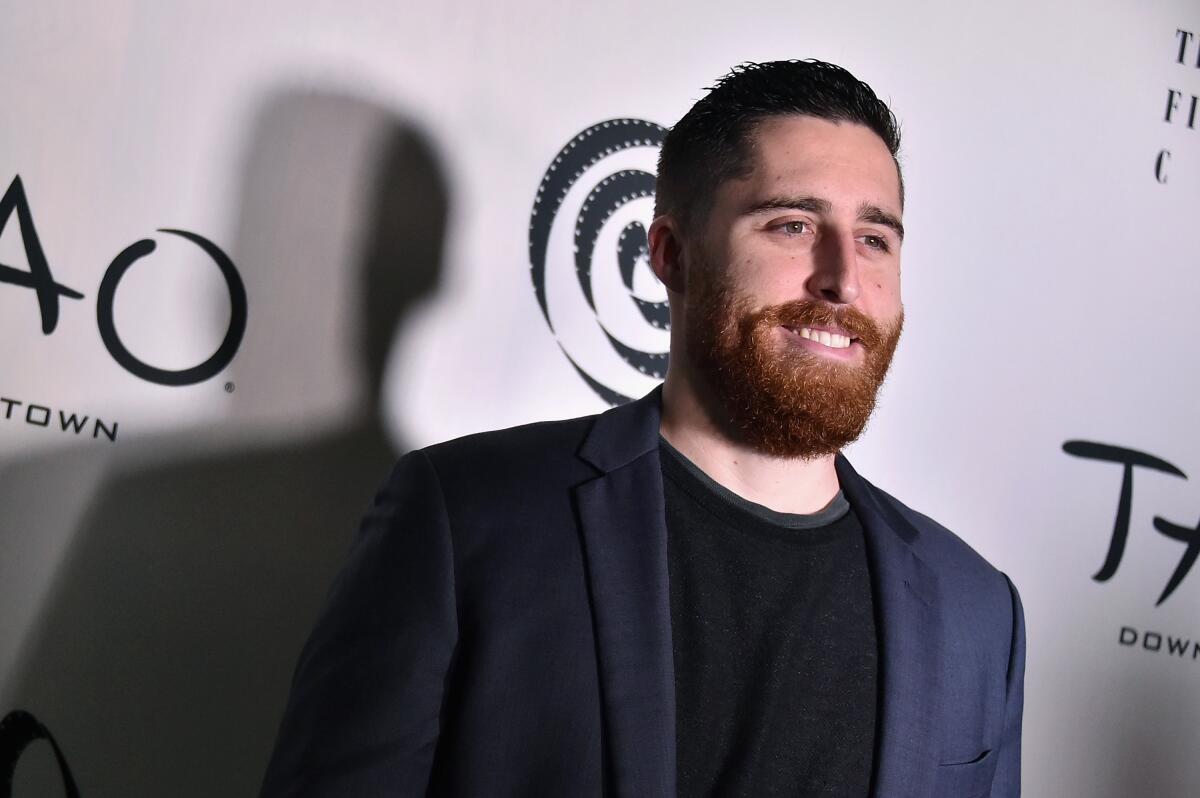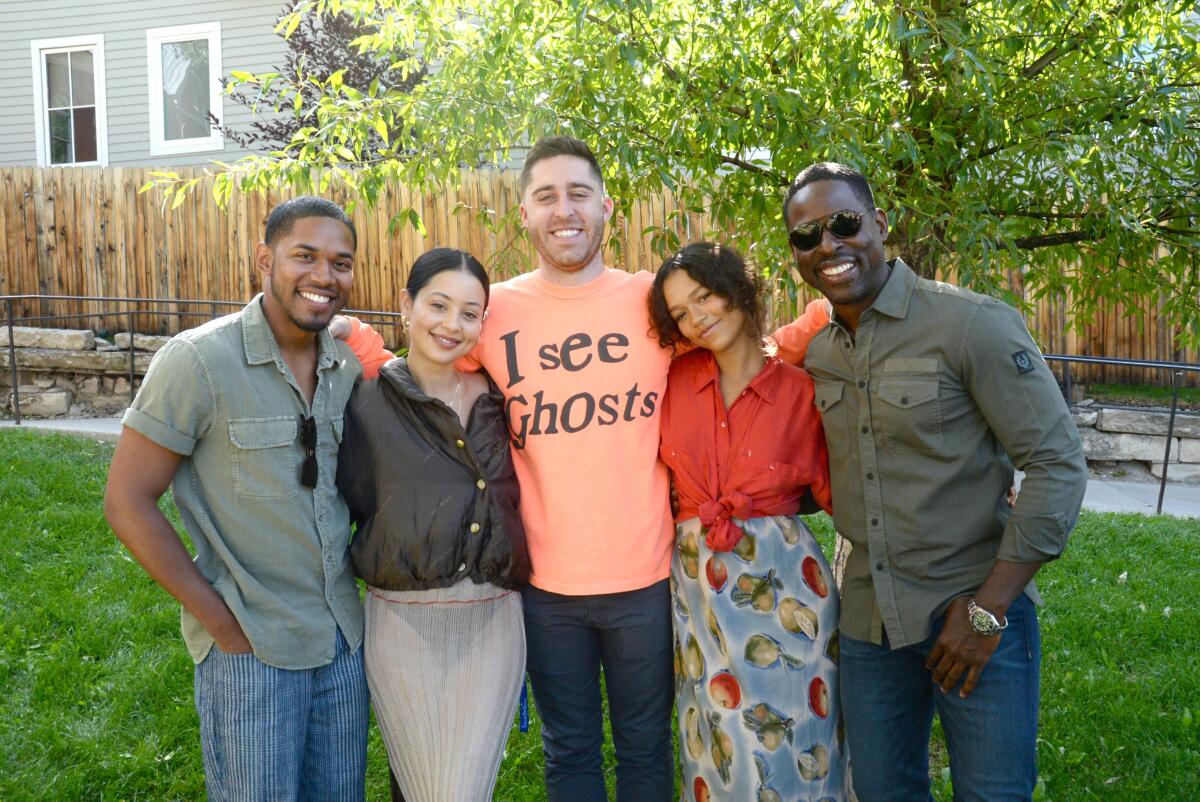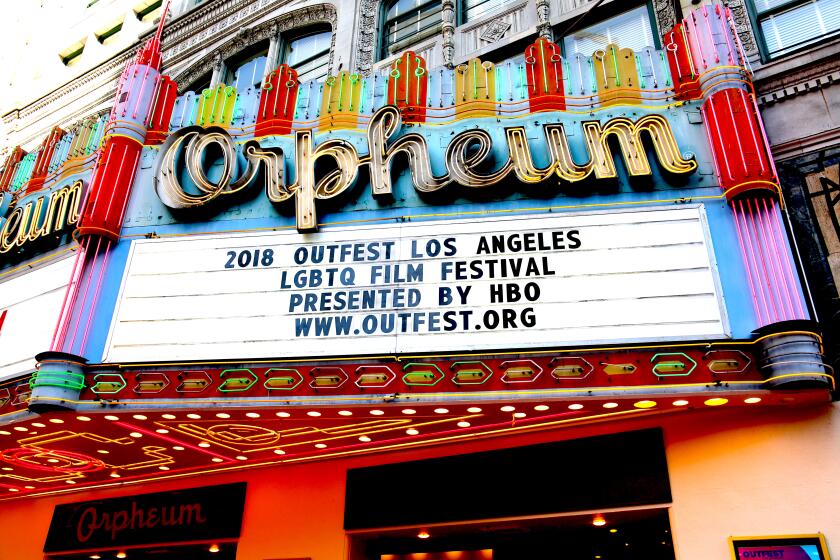Trey Edward Shults’ ‘Waves’ breaks out at Telluride with a story of toxic masculinity and family bonds
TELLURIDE, Colo. — Heading into the world premiere of his wrenching drama “Waves” at the Telluride Film Festival on Friday night, writer-director Trey Edward Shults was so wracked with anxiety that he ducked out of the theater after introducing the movie through tears. The next afternoon, sitting in a restaurant on the town’s main drag, he was still in a daze.
“I haven’t slept,” Shults said. “The altitude, the nerves — it’s amazing, but I feel like a ghost. I just put so much into this movie and I worked on it for so long, I haven’t made peace yet with the fact that it’s not mine anymore and it’s out there.”
Starring Sterling K. Brown, Kelvin Harrison Jr., Taylor Russell and Lucas Hedges, “Waves” sees an upper-class Florida family plunge into tragedy and then agonizingly work to piece itself back together. Split into two halves — one centered on volatile high-school-wrestler brother Tyler (Harrison), the other on his shy, sweet-natured sister Emily (Russell) — the film is a sometimes dizzying, propulsive sensory experience, by turns profoundly dark and quietly tender. Early reviews have been overwhemingly positive, and with the A24 release set to play at the Toronto International Film Festival before hitting theaters Nov. 1, many will be watching to see whether it can catch an awards-season wave.
For Shults, 30, who previously directed the ultra-low-budget family drama “Krisha” and the post-apocalyptic “It Comes at Night,” “Waves” promises to be a potential major breakthrough, a prospect he has clearly yet to wrap his head around. He spoke with The Times about the roots of the film, its portrait of toxic masculinity and the state of the adult-oriented drama.

“Waves” is not an easy movie to describe, and it’s hard to talk about without spoiling the tragedy at the film’s midpoint. How do you explain it to people?
I don’t know, man. I need to get better at this; I don’t know how to put it together in a synopsis and pitch it right. But when I think of it, I think more thematically about what the movie means to me. I would hope the movie feels like the ebbs and flows of life and the highs and lows, especially with love: love between couples and parents and family. The movie was designed as a visceral, immersive experience where you don’t know where it’s going to go and you end in a very different place than where you began. Hopefully, you go on this journey and it hits you emotionally and grows in your mind.
You’ve said that when you first started working on this script, you were initially thinking of it as a high-school movie.
More or less. “Dazed and Confused” just blew my mind as a kid, so when I first started having images and ideas I was like, “Oh, maybe it’s a contemporary ‘Dazed and Confused.’” This was more than a decade ago. Then, as I became a filmmaker and grew, it shifted and just kept morphing and building. At some point, I saw [Wong Kar-Wai’s 1994 film] “Chungking Express,” which has a two-part structure, and I had an epiphany that it could be two parts: a brother and a sister.
All three of your movies have been centered on families in crisis. Has that through-line been conscious for you?
It is conscious to an extent but it’s not where anything starts. It’s not like, “How is family going to work into this?” It just naturally loops back into that again.
We haven’t seen this kind of upper-income suburban African American family placed at the center of many movies. Did you always conceive of that kind of family?
At first, the movie was written totally with race not a factor. But Kelvin and I had already made [“It Comes at Night”] together and I was dying to work with him again. I sent him the script and said, “Who do you want to play?” and he said he wanted to play Tyler. So we sort of built up Tyler and the nuance of a black family together — because clearly I’m a white dude.
It just became a beautiful, organic thing. It’s not a movie about race, but you can’t ignore race. It all came from Kelvin and I saying, “OK, let’s do this,” and grew from there with the collaboration with all the actors.
Looking at Tyler’s relationship with his girlfriend and with his demanding, alpha-male dad, some people have talked about the film in terms of toxic masculinity. Was that something you were thinking about as you were making it?
It wasn’t at the forefront of my mind, but when I was writing, I felt it was naturally bumping into all these things. It wasn’t about “How do we make this portrait of toxic masculinity?” but it was like “How do we make these relationships as nuanced, real and complex as possible?” A lot of that was just about being honest about what it was like for me when I was a [high-school] wrestler and tore my shoulder and went through that period of my life. Then Kelvin took inspiration from the dynamic he had with his father pushing him through music.
It’s fun to see the movie out there and what people talk about because I think you could take out a lot of different things from all throughout it. But Sterling, Kelvin and I, we just wanted to make authentic and complex relationships and people, and then that just naturally leads into a theme.

You’ve never been afraid to make audiences feel uncomfortable or to put your characters in extreme emotional situations, and “Waves” goes to some very dark places. How do you know how far you can push that?
Sometimes you don’t. Sometimes you go too far and in the edit you dial things back. I don’t do it consciously. It’s just where the stories naturally go and shift and take shape. And whether it’s an intense scene or whatever, the important thing is just to be honest to that. All of my movies have gone to a dark place, but this one I think pushes past that and goes to a new area and hopefully gets you on the other side by the end.
Your movies have also all had autobiographical elements dealing with family dysfunction. Lucas Hedges’ character in “Waves” is estranged from his father, who is dying from cancer, which is drawn directly from your own relationship with your father. Do you ever feel exposed putting those things on-screen for everyone to see?
When you’re making the movie, a lot of it is just practical and you brush it aside, but at the very end, it comes back to feeling very vulnerable that you’ve put these pieces of life into your baby and now everyone is just going to take what they want from it. That’s why I go to introduce the movie and I can’t stop crying. No one is ever going to know the nuance of how much of me is there in certain things. But it does feel even more vulnerable with this movie because “Waves” represents in a lot of ways where I am as a person now, and I’m putting all my feelings through it in every aspect.
It’s increasingly tough for adult-oriented movies to find a theatrical audience. As a young filmmaker who was influenced by directors like Terrence Malick and John Cassavetes, do you ever feel like you got to the party too late?
I definitely think about that. It’s not the best time for this right now. But it just makes me want to double down even more on making sure that those are the kinds of movies that I keep making and hopefully my filmmaker friends keep making. I just think now it’s even more essential to push even harder.
I love all movies, but if all we have at the theaters is one kind of movie — come on, we need other layers and complexity and variety. It’s a nutty time, but I think you just have to work even harder to make films that get people’s attention, because otherwise they’re just going to wait and watch it at home. At the end of the day, as long as people see it in some capacity, that’s amazing. But I’ve had the most profound times of my life seeing movies in a theater with other people and I can’t imagine for my own sake not being able to have that.
The early reaction to “Waves” has been incredibly positive. Do you have any sense yet of what it might mean for your career going forward?
I don’t know. I have no objectivity at all. I live in Florida, and that’s been great just to be able to disconnect and stay grounded and live in a place where no one knows you or cares.
I’ll skim Twitter or a review and I’ll hear people talking but I’m just, like, glazing though. I just have to get through the festival and then have a few days to get back to a normal elevation and sleep and then take in what’s going on. Right now, I’m just like, “What is happening?” It’s surreal.
This interview has been condensed and edited.
More to Read
Only good movies
Get the Indie Focus newsletter, Mark Olsen's weekly guide to the world of cinema.
You may occasionally receive promotional content from the Los Angeles Times.










